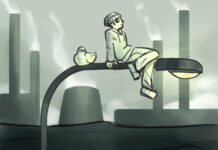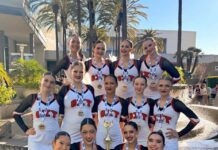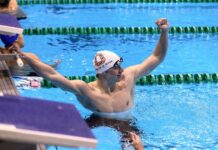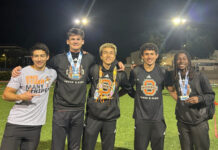Down by two points with seven minutes left, fly-half Barnaby Audsley (senior) scored a penalty kick that reinvigorated the Occidental men’s rugby team. The squad went on to erase a ten-point deficit on its way to locking down Sonoma Sate in a 27-19 playoff victory on March 16.
The Tigers played flawless defense, according to club president and hooker Anthony Avila (senior). Head coach Dallen Stanford echoed that the win was an all-out team effort.
“The players put everything on the line for each other,” Stanford said.
Occidental retained its fourth consecutive Doherty Cup in February with a 37-5 win over Loyola Marymount before setting a team record 104-0 win against Biola.
The unit’s efforts qualified Occidental for the Southern California Rugby Football Union Gold Coast Cup final with a 26-5 victory over Azusa Pacific in the semifinals on March 8. After defeating Azusa, Occidental was then bounced by Pepperdine in a 26-24 final-round heartbreaker the following day.
After failing to win the Gold Coast Cup (GCC) on a campaign in which it began with high expectations, the team qualified for a separate tournament, the Pacific Coast Cup (PCC), upon beating Sonoma State.
Though they put up a fight, Occidental surrendered its first-round PCC match-up to the much deeper Santa Rosa Junior College (SRJC), 38-7, in a contest on March 22 that culminated the fifteens (15s) team’s strong 8-2 season.
According to flanker David Kim (senior) and prop Oscar Flores (senior), the unit was overconfident in its defense against Santa Rosa due to their earlier success against Sonoma State.
“We made uncharacteristic mistakes,” Avila said. “Our seniors were playing with a lot of aches and pains.”
Larger colleges like SRJC have expendable rosters, an advantage that Occidental’s team of 27 lacks.
“Without sufficient recovery time and several injuries to key players meant that we were always going to struggle against a school that has approximately 26,000 students,” Stanford said.
The Occidental starters play through injuries because the bench contains mostly rookies. According to Kim, the starters have a lot of weight on their shoulders to stay on the field, often downplaying even the most serious of injuries.
In addition to their relatively small roster size, the rugby team has limited access to collegiate athletics trainers due to its status as a club sport.
“We can only attend to rugby on game day or to protect against catastrophic injuries,” associate trainer Taylor Woods said.
Flores went as far as to play through a separated acromioclavicular (AC) joint this season.
Stanford asserted that recruiting football players would add strength and size to the 15s roster, which currently consists of smaller, more agile players built more for rugby sevens (7s).
Occidental has now begun training for 7s, a more condensed version of the game with roughly half as many players and seven-minutes halves instead of the normal 45. The 7s squad is traditionally Occidental’s more competitive of the two teams, as it won a national championship in 2013.
“It’s seven minutes of hell,” Flores said. “Sevens requires being fast and shifty; having a lot of agility.”
Ten of the quickest men from the 15s team will earn a spot on the 7s roster.
“With key players from last year’s championship squad returning, the main aspect will be to see which players will be back from the injury list,” Stanford said.
Avila anticipates a few rookies making the cut as Occidental expects to defend its title. Furthermore, he believes that some players will look ahead to the 2016 Olympics, which has added rugby 7s for the first time.
“There is indeed a possibility [of Occidental players heading to the Olympics],” Stanford said. “But these players would need to be brought into the USA 7s squad fairly soon, as they need time to play international rugby throughout 2015.”
As the 2013 National Small College Rugby Organization (NSCRO) 7s tournament’s Most Valuable Player and a USA Rugby Honorable Mention All-American selection, Audsley has a chance to make the US team’s roster for the 2016 Rio Games. His teammates said Audsley showed Olympic potential at the 2013 US National Under-20 team tryouts.
Flores and Kim downplayed the thought of going to the Olympics themselves and said that the team is focusing more on cementing itself as a national powerhouse.
“I am extremely proud of the team for their determination and sacrifices made both on and off the field to continue building one of the best Small College rugby programs in the country,” Stanford said.
The team is excited to open up the 7s season ranked No. 1 nationally as it attempts to solidify its place atop the upper echelon of collegiate rugby.
![]()






























